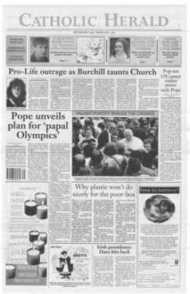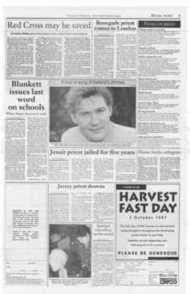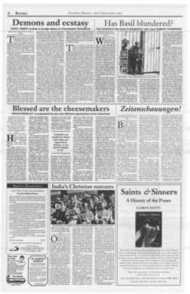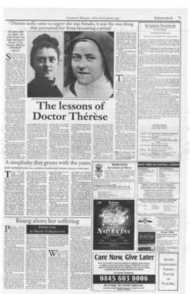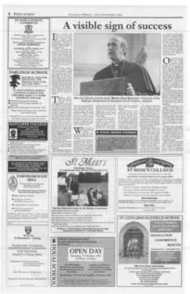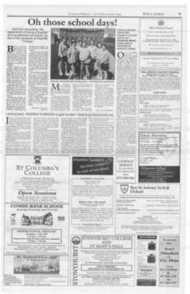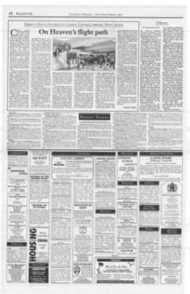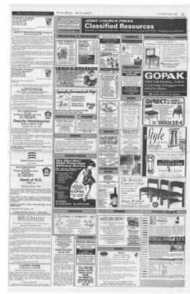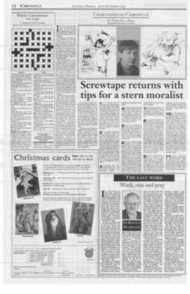Page 6, 26th September 1997
Page 6
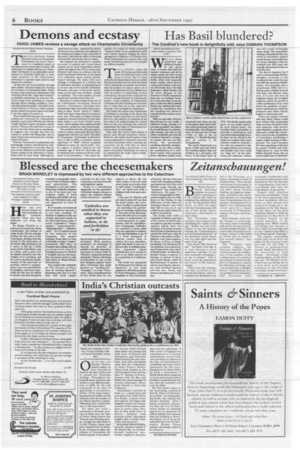
Report an error
Noticed an error on this page?If you've noticed an error in this article please click here to report it.
Tags
Share
Related articles
Fast Forward To Video Piety It's Basil In Blunderland!
Just Child's Play?
More Lenten Reflections From Cardinal Hume
The Cardinal Reflects
Cardinal Hosts Launch Of Hume Biography
Has Basil blundered?
The Cardinal's new book is delightfully odd, says DAMIAN THOMPSON
Basil in Blunderland by Basil Hume, Darton, Longman & Todd £7.95
WAIS IT about celebrities and children's books? At any given time, it seems that half the nation's actresses and all its minor royals are busy trying to turn themselves into Roald Dahl, often with tragically inept results: when history comes to be written, I am sure we will decide that a fat little helicopter called Budgie did far more damage to the Duchess of York's reputation than any toe-sucking Texan. So it was worrying, to say the least, to discover that Cardinal Hume was writing this book. Could it be, I wondered, that the Cardinal was about to commit his first serious error of taste?
Well, we can relax. Basil in Blunderland is not really a children's book, though it is not quite an adults' one either. Its overall flavour is undoubtedly strange, but only in the rather wonderful way that the Cardinal himself is strange. As anyone who has met him knows, his personality combines solemnity and playfulness. In any other author, the combination of a children's game with musings about salvation might seem contrived, and there are one or two places where the Cardinal comes perilously close to sounding like Alan Bennett's vicar in Beyond the Fringe ("Life is like a tin of sardines..." ). But for the most part he carries it off triumphantly.
The book's framework is a game of hide and seek which the Cardinal played with two children in a draughty old house in Scotland back in 1979. (The family sounds quite posh, as one might expect.) In each hiding place, the Cardinal finds something to provoke a meditation, and very fresh and touching reveries they are too. Stuck in the larder, he wonders what God's attitude would be towards a boy who was tempted to take an apple without permission, and decides that God would say "take two". In the bathroom, the medicine cabinet sets off a train of thought about death. He remembers visiting a dying friend who was wired to machines parked round his bed, and recalls how his mood changed when he realised that this man was actually immersed in the sea of God's love.
Not that it matters, but I wasn't convinced that all these thoughts occurred to the Cardinal in the order he says they did: the mention of landmines, for example, has a suspiciously 1990s feel to it. But the game of hide and seek with Kate and Barney rings true. It is just the sort of impulsive thing the Cardinal would do, and it set me off on a little meditation of my own about the qualities of spontaneity and humour which he possesses and other church leaders so obviously lack.
There are many reasons why only Basil Hume could have written this enchanting book, not least of which is that only someone who doesn't make blunders could get away with such a bold title. Somehow I can't see the Archbishop of Canterbury publishing a volume called George in Blunderland. Nor can I imagine Dr Carey agreeing to take part in a game of hide and seek. Think about it: once he had hidden himself away, who on earth would want to find him?
blog comments powered by Disqus


